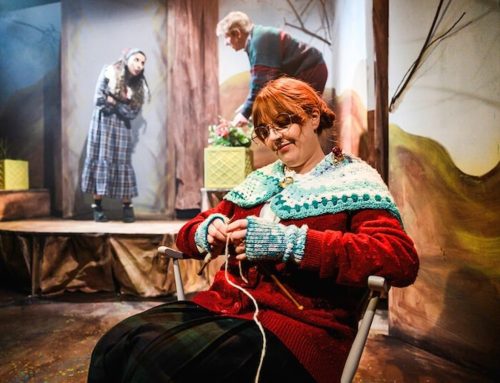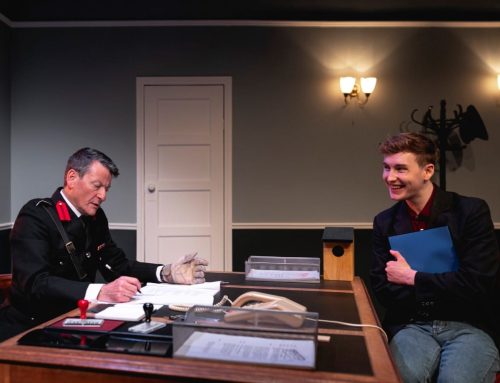The opening of Gareth Armstrong’s A Critical Stage finds the show’s protagonist, theatre critic Jimmy, gagged, bound hand and foot, slumped over his writing desk. His perilous position arises not from the actions of an irate creative in receipt of a bad review, though that would no doubt be justified, but from a romantic tryst with a guardsman gone dreadfully awry. Thankfully soon set free by faithful houseboy Smike, the critic’s confinement provides a suitable metaphor for the various states of bondage in which each of the show’s characters find themselves. Jimmy himself is trapped in a wartime London of blackouts, rationing, the Blitz, and career-threatening homophobia. Actor Gwen cannot escape from a pattern of maligning theatre critics as jealous vampires, feeding on the blood of artists such as herself. Jimmy’s secretary, Austrian Jewish refugee Leo, has his own challenges liberating his mind from bitter memories of Nazi terror. Unseen neighbour Peter is trapped in a prison of ill-health. Each, in their own way, is here destined to shake off the shackles that bind them.
Loosely based on the life of James Agate, the hugely influential writer who dominated English literary and theatrical criticism in the inter-war period, A Critical Stage feels like a revival more than a new work. A revival not so much of a particular play, but of a particular type of ‘well-made play’ that more or less died off with Terrence Rattigan. Perhaps the titular critical stage Armstrong is referring to is that point at which writers, not long after Agate’s death, stopped writing tightly plotted shows like this about the hidden secrets of upper-middle class people and their acolytes. Enjoyable, sharp, and immaculately acted though it is, A Critical Stage feels something of an oddity: a kind of meta-theatrical homage not just to a critic, but to a style of playwriting the critic critiqued.
Once unbound by Smike (Sam Hill), the hungover Jimmy (Jeremy Booth) finds himself confronted with an unwelcome visitor in the form of fifty-something actor Gwen (Barbara Wilshere). The critic has written a damning assessment of her Lady MacBeth and she is not having it. Jimmy insists that it was Gielgud’s perverse casting rather than her abilities he was appraising, but her ire is not assuaged. One cannot help feeling for the actor. Jimmy is the kind of writer who reviews books he does not read, writes reviews in advance, eagerly damns shows he leaves half-way through (he does not have to eat the whole meal to “know what it tastes like”) and drops the names of more dead actors he has known than a tree sheds in autumn. But he insists, he is every bit as much as an artist as Gwen – his art is criticism, and he is very good at it.
Jimmy’s comfortable existence is soon threatened. His friendship with Gwen is at a turning point. A drunken visit to a male brothel sees his Sunday Times employment put in jeopardy. Leo (David Acton), his secretary faces arrest as an unregistered alien. Worse, his beloved friend Peter is rushed to hospital. Jimmy soon has to face up to a question. What kind of critic does he wants to be?
Booth is tremendous as the smug, self-satisfied Jimmy whose stale superficiality conceals a steely determination not to miss the next big thing in drama. Wilshere is great too as Gwen, even if her character’s reflections on the role of the critic in the theatrical ecosystem occasionally read like a drama textbook. Sam Hill is watchable but does not have a huge amount to do as straight houseboy Smike, a personage whose blind eye towards the seedier aspects of his employer’s lifestyle feels a tad anachronistic. The star turn here, though, is really Acton as damaged refugee Leo. His journey towards rediscovering self-confidence as a concert pianist may be contrived, but Acton’s sensitive performance is perfectly judged.
There are times, particularly in the first half, when A Critical Stage comes close to being a pastiche of the drawing room, comedy-of-manners that predates even Rattigan. Jimmy may not be fan of Noel Coward, but in their wistful humour, constant bickering, and verbal fencing Armstrong’s characters could have walked straight out of Blithe Spirit. A Critical Stage may not be to everyone’s taste, but there is a gentleness here that entices and entertains in equal measure.
Writer and Director: Gareth Armstrong
More Recent Reviews
Playfight. Soho Theatre.
Writer Julia Grogan’s breathtakingly assured debut play arrives at Soho Theatre following stellar reviews at the Edinburgh Fringe and [...]
All The Happy Things. Soho Theatre.
Naomi Denny’s three-hander comedy-drama All The Happy Things covers familiar themes within a recognisable premise. A grieving protagonist comes [...]
Telly. Bread and Roses Theatre.
The challenge with absurdist comedy is that many people do not find it funny. Laughing at the sheer weirdness [...]




